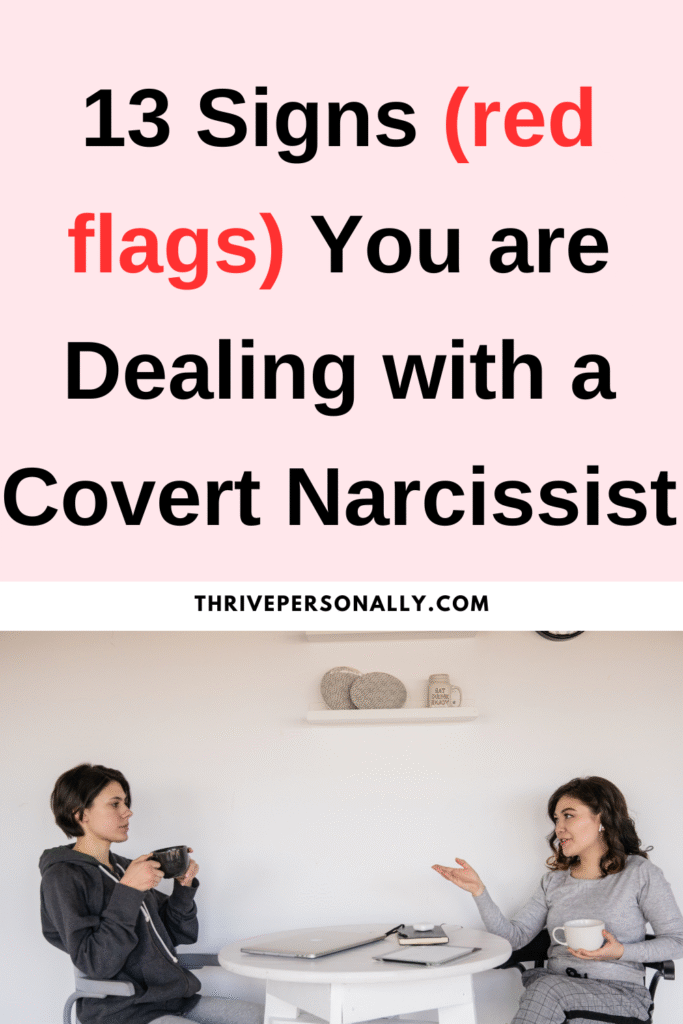It can be one of the most bewildering aspects of life when a person in your life is showing him or herself to be kind on the exterior, but something always seems to be amiss on the inside. You can feel insecure. You can think that you are always wrong. But what if you are not? What happens when the individual in your life is a closet narcissist?
Covert narcissism is not loud or flamboyant like you might expect. It wears a mask of humbleness, silence, or even shyness. However, it can be just as harmful. The signs are quieter, but they are equally dangerous—if not more. Below are 13 red flags that go beyond personality traits. These signs help you see through the fog and protect your peace.
1. They Are Always the Now-You-See-Me-Now-You-Don’t
A hidden narcissist won’t scream or fight publicly. Instead, they often play the victim. Even when they offend you, they twist it and make you feel bad. They might say, “I must be such a lousy person, right?” It sounds like guilt, but it’s a trap meant to win your sympathy. Over time, you begin to doubt your feelings and blame yourself for things that were never your fault.
Read also: 10 Effective Ways to Make a Narcissist Miserable
2. They Apply Silent Treatment Frequently
Silent treatment is a powerful covert weapon. They don’t raise their voice—they simply go silent. When you set boundaries or say something they don’t like, they can go days without talking to you. This isn’t peace. It’s punishment. It’s a way to make you feel guilty, scared, or left out until you give in.
3. Passive-Aggressiveness Is Their Language
Covert narcissists don’t slam doors—they stab with words. They may say things like, “Wow, I can’t believe you managed that,” or, “Must be nice to do nothing all day.” These are not jokes; they are subtle jabs meant to make you feel small. The worst part? You might ignore one or two—but they pile up.
Read also: 15 Characteristics of a Narcissistic Individual
4. They Demand Compliments in a Hidden Manner
You might think narcissists boast openly. Not these ones. Covert narcissists fish for compliments by acting insecure. They might say, “I don’t think I’m good enough,” just to get your reassurance. Their humility is not real—it’s bait to get attention and approval.
5. They Bitterly Remember Real Long
They don’t let things go. A covert narcissist may bottle up something you said or did and bring it up months later. They might even punish you without saying why—by acting cold or withholding help. They don’t forgive unless it benefits them.
6. They Fail to Empathize
Empathy means feeling what others feel. This is hard for a covert narcissist. They might pretend to listen, but when you’re truly in pain, they seem cold. If you’re anxious or sad, they might say, “You’re too sensitive,” or, “You always make things about you.” This shows they are emotionally closed to anyone but themselves.
To understand more about how this works, the Mayo Clinic’s article on Narcissistic Personality Disorder explains the emotional disconnection involved.
7. They Take Criticism So Very Much to Heart
Even helpful feedback feels like an attack to them. If you point out something, like them forgetting your birthday, they may respond with, “I must be the worst person ever,” making you feel guilty. Their ego is fragile, so they reverse blame instead of facing their flaws.
8. They Cause Chaos in the Discussion
You might feel more confused after talking to them. Covert narcissists twist words masterfully. If you call them out, they might say, “I didn’t say that,” or, “You misunderstood me,” even when you’re sure of what happened. This is called gaslighting—making you question your memory or emotions.
9. They Do Not Take Responsibility
To them, nothing is their fault. If caught lying, they’ll make excuses or blame others. They won’t say, “I was wrong.” Instead, they justify their actions or say you provoked them. They protect their ego at all costs—even if it means distorting the truth.
10. They Require a Lot of Control
Covert narcissists don’t control through force, but by guilt. They can make you feel bad until you give in. They use your past mistakes against you. Bit by bit, you realize you’re afraid to say no. You can’t do what makes you happy without upsetting them.
11. They Have Problems Connecting with Reality
They may be in a relationship with you—but not really with you. They’re self-centered. When you speak, they may only pretend to listen. They forget what matters to you. They only tune in when something affects them. True intimacy, where two people care for each other, scares them.
12. They Like to Appear Morally Superior
They try to seem holier-than-thou. They may act overly kind, religious, or ethical—but it’s all for show. They help others to look good or feel powerful. They might use their “goodness” to shame you or make you feel lesser.
13. You Get Exhausted in Their Presence
At first, you don’t notice. But over time, you feel drained, sad, confused. You start over-apologizing, walking on eggshells, losing your joy. When someone makes you feel empty and emotionally worn out consistently, that’s a sign you’ve been dealing with a covert narcissist.
Why These Signs Matter
Covert narcissists do not always look like villains. They manipulate through silence, fake meekness, or guilt. But their impact is deep—sometimes more harmful than obvious, loud narcissists.
When you spot these signs, you can stop blaming yourself. You are not too sensitive or too needy. You’re being eroded. Covert narcissism confuses you, because it’s subtle and slow.
If you recognize many of these red flags in someone you know, believe your gut. Your feelings are trying to tell you something. You may need to set boundaries—or even walk away—to protect your peace.
What to Do When You Encounter a Covert Narcissist
Trying to fix someone with these traits often leads to more pain. Instead, protect your emotional health.
Here’s what you can do:
-
Start by learning more about narcissism, especially covert types. Videos by Dr. Ramani or articles by trusted health sources can help you grow stronger and more aware.
-
Set clear boundaries. Say no when needed. Don’t feel guilty for protecting your peace.
-
Consider talking to a therapist, especially one who understands emotional abuse. Therapy is not about fixing something broken—it’s about getting your strength back. If you don’t know where to begin, the National Domestic Violence Hotline offers help not only for physical abuse but also emotional harm.
-
Surround yourself with people who respect and uplift you. Don’t let anyone reshape how you see yourself. You deserve peace, love, and respect.
Final Words
You are not crazy. You are not weak. If something doesn’t feel right—even if you can’t explain why—trust that feeling. A covert narcissist won’t scream at you, but they’ll slowly steal your joy, confidence, and sense of safety.
Recognizing the signs is the first step to reclaiming your power. You deserve to be seen, heard, and respected. If they don’t give that to you—no matter how polite or soft they seem—it’s okay to walk away.
Your peace is worth protecting. Always.
Save the pin for later

